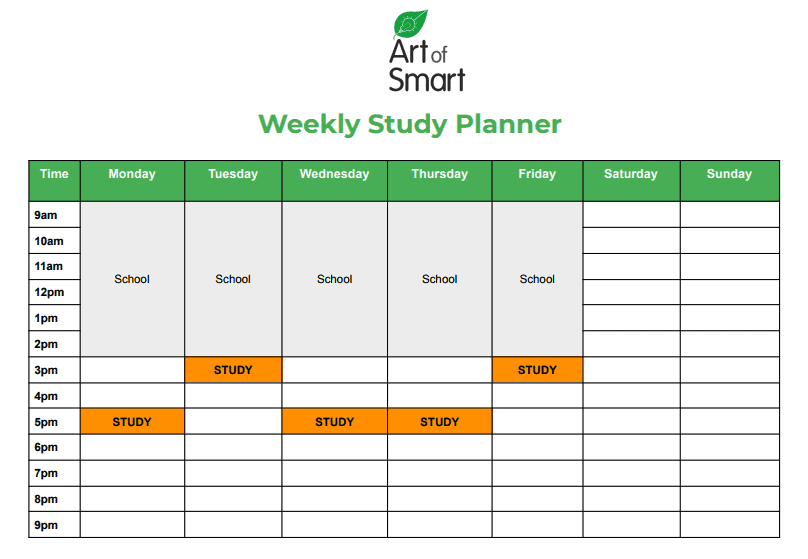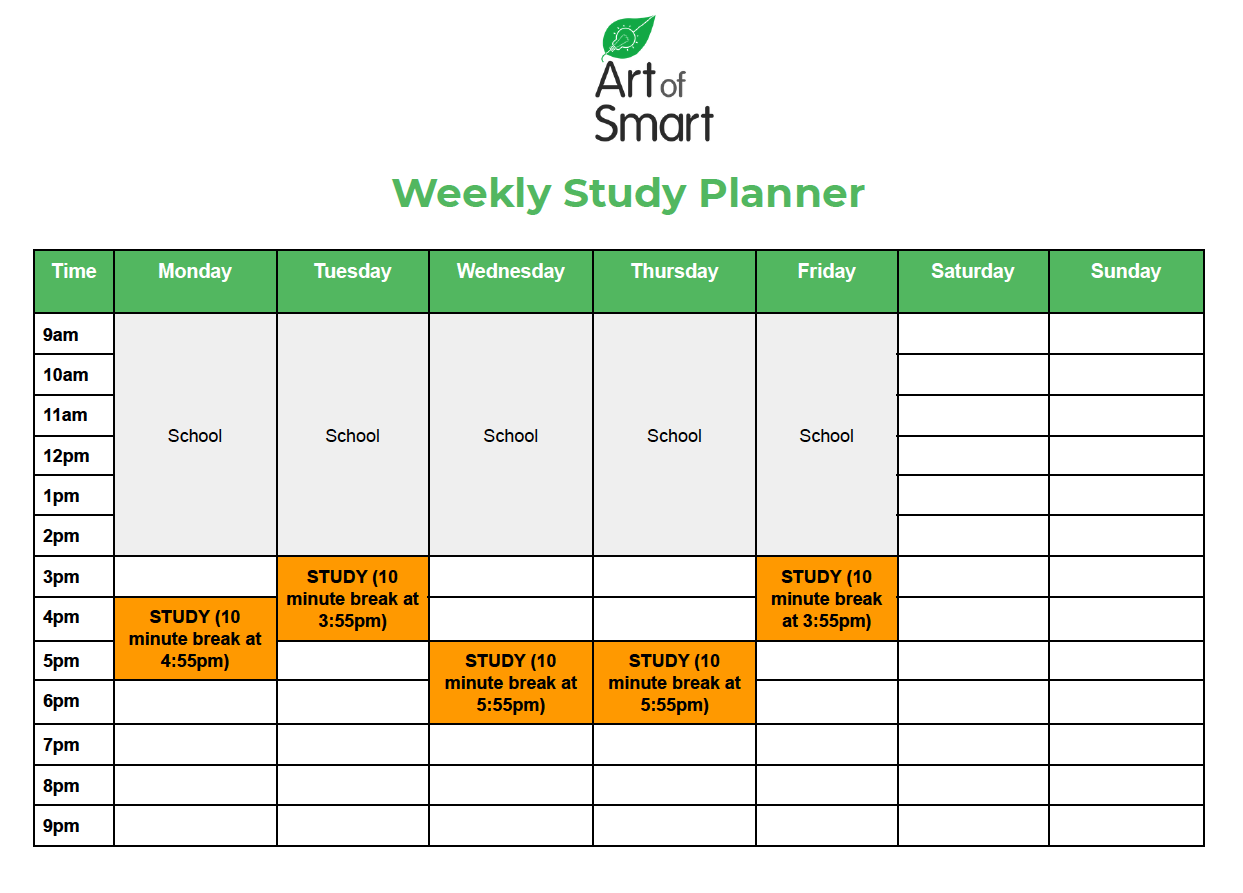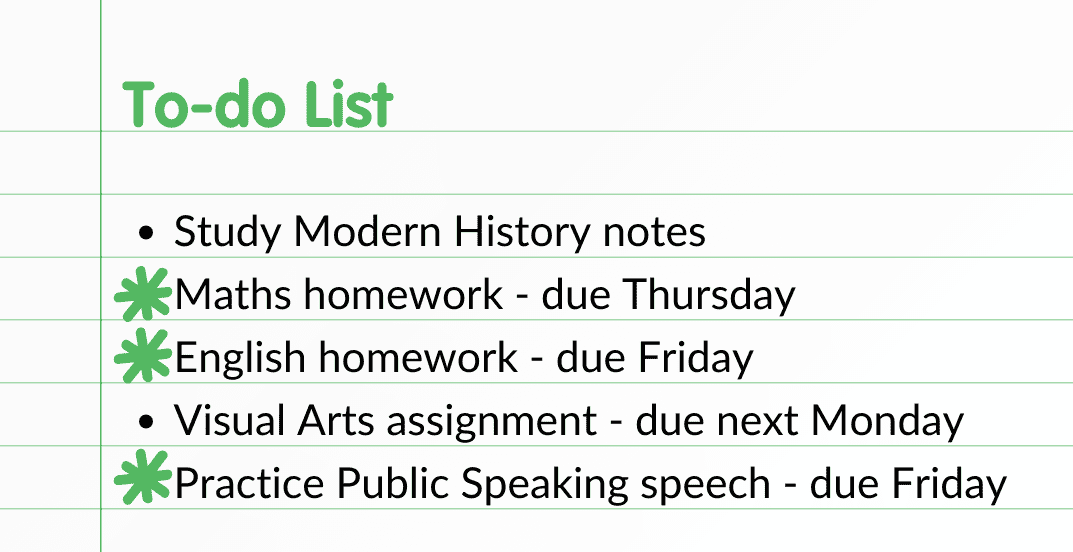
Trying to implement a tool or strategy that will help your child excel during their HSC? Ever thought of developing a study plan with them?
Throughout the research we’ve conducted with Australia’s top students (98+ ATAR), we’ve discovered that they get more out of their individual study time than other students. The majority of students tend to struggle with studying effectively on their own — and that’s where a study plan is absolutely essential!
Keep reading to learn the steps to helping your child create a study plan that gets results!
Helping Your Child Develop a Powerful Study Plan
Step 1: Indicate Specific Times of the Week Where Study is Non-Negotiable
Step 2: Identify Predetermined Break Times
Step 3: Set Focussed Study Outcomes
Step 4: Remove All Distractions
Step 5: Make the Study Time Bound
How can you help your child develop a powerful study plan?
A powerful and simple metaphor that we have found highly effective for helping students developing powerful study habits is training for sport — something that most people intuitively understand.
Let’s assume you know absolutely nothing about playing tennis and you were given the challenge of learning to play tennis to compete in a competition at the end of the year — can you already see the similarities to studying for Year 12?
What would you do?
My guess (based on asking this question to hundreds of students and parents across Australia) is that you would at a minimum:
- Find a coach
- Organise weekly training sessions
- Start playing tennis matches on a weekly basis
If we drill down into this a little further — each of your weekly training sessions would likely fit the following structure:

Specific times during the week that are non-negotiable — e.g. Monday 5pm, Wednesday 6pm
Pre-determined breaks for set times, designed to help you push and then recover so you can maintain high intensity — e.g. 45 minutes of hard work, 5 minute recovery break, 45 minutes of hard work.
Outcomes focussed: Your coach would look to achieve specific things with you each training session — e.g. working on your technique for your serve, or perhaps your backhand volleys
Removal of all distractions: It’s only you and the equipment you need to train for tennis. No mobile phones, music, or other people.
Time bound: Clear end time for each training session, so you know how long you need to work hard for before you can rest completely — e.g. Monday 5-8pm, Wednesday 6-9pm.
If this structure works so well, and is so universally prevalent for improving in sport, why shouldn’t study be the exact same?
Studying is essentially training in an academic pursuit!
So, how can you apply this SPORT metaphor and acronym to studying to create a powerful study plan with your child?
Step 1: Indicate specific times of the week where study is non-negotiable
Ideally study should occur daily as consistent study is key for creating academic success.
Work with existing habits and your child’s schedule to set a daily non-negotiable start time for study. Non-negotiable is key. You wouldn’t cancel on training because you’d let your coach down. Study needs to be similar — it must come first.
For example, Monday 5pm, Tuesday 3pm, Wednesday 5pm etc.

Within this specific study time, students should focus on the following study methods that our research with top students revealed to be most effective:
#1: Focus on developing an intimate knowledge of the syllabus
Most students drop marks across their assessments, with feedback provided such as ‘You are on the right track, but don’t have sufficient detail’ because they haven’t built a strong knowledge foundation.
Head to our Resources page here for subject guides and study tips!
#2: Learn material ahead of the class
Top students would frequently make a point of going ahead of the class as they found it dramatically improved memory retention.
Learning ahead also gives students the opportunity to ask questions and clarify any content they had trouble understanding with their teachers.
#3: Teach others
We asked top students the #1 study strategy they used to study was to actually teach others! Sounds unusual, but often the first time students get feedback on their knowledge is the exam itself which is the worst time to get feedback.
Teaching others is great for memory retention, and allows you to get feedback on your knowledge before the exam!
#4: Work on HSC practice questions weekly
If you train for a sport, you play a game weekly and your child should do the same for study!
Most students leave working on practice HSC papers and questions until right before the exams and then never ever complete enough practice questions to develop their exam technique and never get them marked.
#5: Focus on weak areas prior to exams
Usually most students take guesses as to what they are weak in. Your child should work towards building a strong understanding of these so they can maximise their results in the exams.
Step 2: Identify predetermined break times
Most of the time when students study they tend to take breaks whenever they feel like it — so when they’re hungry, a friend calls, they get a Facebook notification, or if they get bored! Often, what is meant to be a short break then becomes a 2 hour exercise in procrastination.
Like training for sport, help your child identify specific times they will take breaks prior to sitting down to study, and identify with them how long these breaks will be for.
For example, if they intend to study on Monday from 4pm to 6pm, you might plan with them to have a break at 4:55pm for 10 minutes, and then resume study at 5:05pm until 6pm.

Map this out for each day they have scheduled specific non-negotiable study periods.
Learn more about dealing with procrastination in our article here!
Step 3: Set focussed study outcomes
Often when students sit down to study, they don’t have a clear idea of what they need to achieve in a given period of time.
Intensity of study or productivity is output over time. If a student doesn’t know what the goal is in terms of output for a study period, there is no way they can improve the productivity of their study time!
The simplest way to change this is to encourage your child to create a to-do list at the beginning of each study session. Get them to sit down and identify all the things they need to work on — prioritise it and identify 2-3 of the most important items.

Encourage them to make a commitment to complete these 2-3 items (or components of these) in their specific study period for that day.
Step 4: Remove all distractions
This step is all about having a designated study area and implementing guidelines for this space.
In setting up a specific area for your child to study, it’s important to consider where the best space to study is. The key here is to remove anything that is not necessary at the time for study. The less temptations the better!
A bedroom tends not to be the best environment for your child to study, as there can be many distractions, as well as you child having a strong association between their bedroom and sleeping. Studying in their room can make them want to sleep instead of focussing on their work.
Once you’ve decided on a spot for their study area, you should set some guidelines for using that space. Some rules you might want to implement are:

Step 5: Make the study time bound
This is the final step in the process of making a simple, yet very powerful study plan. Make the study time have a clear end time.
Parkinson’s Law states that work expands to fill available time. Typically students often come home and sit down to study all afternoon, with nothing else planned and no-end time. This often leads to procrastination as ‘I have all afternoon to finish this’ mentality creeps in.
Setting a specific end time reduces procrastination. It also is vital to create high intensity study.
If I asked you to run really fast and didn’t tell you for how long, or for how far, would you run quickly, or slowly? Probably slowly, and not be all that motivated.
Study is exactly the same! By setting an end time, you can work really hard, knowing that at a certain time you can finish and relax!
And that’s it!
Remember, keep your child’s study plan simple — a study plan aims to effectively change their habits, and changing any habit is difficult, so keeping things simple is key to ensuring your study plan will have a positive impact on the effectiveness of your child’s study.
A new habit usually takes a minimum of 30 days to develop, so encourage your child stick to the study plan for 30 days and more. Even if they don’t follow it perfectly — something is always better than nothing!
Are you looking for some extra help for your child during the HSC?
We have an incredible team of HSC tutors and mentors!
We can help your child master their HSC subjects and ace their upcoming HSC assessments with personalised lessons conducted one-on-one in your home or at our state of the art campus in Hornsby or the Hills! Check out our K-12 tutors in Kirribilli, all across NSW, Queensland, and Victoria!
We’ve supported over 8,000 students over the last 11 years, and on average our students score mark improvements of over 20%!
To find out more and get started with an inspirational HSC tutor and mentor, get in touch today or give us a ring on 1300 267 888!


